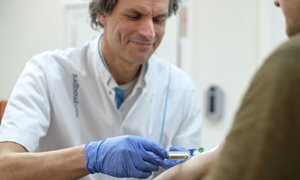.aspx?width=800&height=533&ext=.jpg&type=BlockColumn1Zoom1)
To determine whether someone has Lyme disease, doctors in the Netherlands often use antibody tests. For some time now, so-called cellular tests have been available on the market. However, the VICTORY study recently carried out by Amsterdam UMC, Radboud University Medical Center and the National Institute for Public Health and the Environment (RIVM), has found that these tests are not reliable. With these new tests, too many people get a false negative or false positive result. The findings of the study can be found in The Lancet Infectious Diseases.
The standard blood test for Lyme disease measures the presence of antibodies against the bacterium that causes the disease. ‘If the antibody test comes up positive, you do not always know for certain if the infection with the Lyme bacterium is still ongoing, or if antibodies are still present due to a previously contracted infection from which you may already have recovered’, says Ewoud Baarsma, researcher at Amsterdam UMC. ‘The cellular tests examined in the study measure the activity of certain immune cells in the blood against the Lyme bacterium. We were hoping that the new tests would be better than the current antibody tests. Unfortunately, this is not the case.’ Various commercial laboratories use these cellular tests and some Dutch people use them to have their blood tested in Germany.
Incorrect test result
Three different groups took part in the study: patients with Lyme disease, healthy people, and a group of people with diseases that are known to interfere with tests for Lyme disease. A number of cellular tests were examined. Freek van de Schoor, researcher at Radboud University Medical Center: ‘We have investigated several cellular assays and we found that the new tests regularly produced false negatives, wrongly indicating that test subjects did not have Lyme disease. Or vice versa: tests came up positive, but the test subjects did not actually have Lyme disease. In practice, this would lead to many people getting the wrong treatment on the basis of these test results.’ Baarsma: ‘Although we can only make a definitive statement about the tests that were examined, the study shows that you should be careful with the use of blood tests for Lyme disease whose reliability has not been established. The use of these tests is not recommended. Amsterdam UMC, Radboudumc and the RIVM are continuing their efforts to improve the diagnosis of Lyme disease.’
More information
This study has been published in The Lancet Infectious Diseases: Diagnostic parameters of cellular tests for Lyme borreliosis in Europe (VICTORY study): a case-control study M E Baarsma, Freek R van de Schoor, Stefanie A Gauw, Hedwig D Vrijmoeth, Jeanine Ursinus, Nienke Goudriaan, Calin D Popa, Hadewych JM ter Hofstede, Mariska MG Leeflang, Kristin Kremer, Cees C van den Wijngaard, Bart-Jan Kullberg, Leo AB Joosten, Joppe W Hovius.
-
Want to know more about these subjects? Click on the buttons below for more news.
More information
Annemarie Eek

wetenschapsvoorlichter
Related news items

With concerted effort, tuberculosis could be eradicated in 30 years time March 24th was World Tuberculosis Day
24 March 2022 Since 2020, the number of deaths from tuberculosis increased for the first time in a decade, caused by the COVID pandemic: fewer people had access to the right care on time. Some catching up is needed. read more
NIH grant for follow-up research on tuberculous meningitis
10 February 2022Met subsidie van het Amerikaanse NIH gaat With a grant from the U.S. NIH, Reinout van Crevel will continue to unravel the disease process of tuberculous meningitis.
read more



